Analysing Organisational Behaviour, Culture and Motivation at BBC
VerifiedAdded on 2020/07/22
|14
|4349
|36
Report
AI Summary
This report provides an in-depth analysis of organisational behaviour at BBC, a global entertainment and broadcasting corporation. It explores Handy's cultural typology and its relevance to BBC, examining the impact of culture, power, and politics on employee behaviour. The report delves into content and process theories of motivation, highlighting how these theories can improve team effectiveness within BBC. It also discusses different types of teams at BBC and applies Tuckman's model for team development. Furthermore, the report evaluates organisational theories and concepts, identifying barriers that affect BBC's performance. The analysis draws from sources like the Smith review to provide a comprehensive understanding of how BBC manages its workforce and navigates the complexities of organisational behaviour to enhance productivity and maintain a healthy work environment.
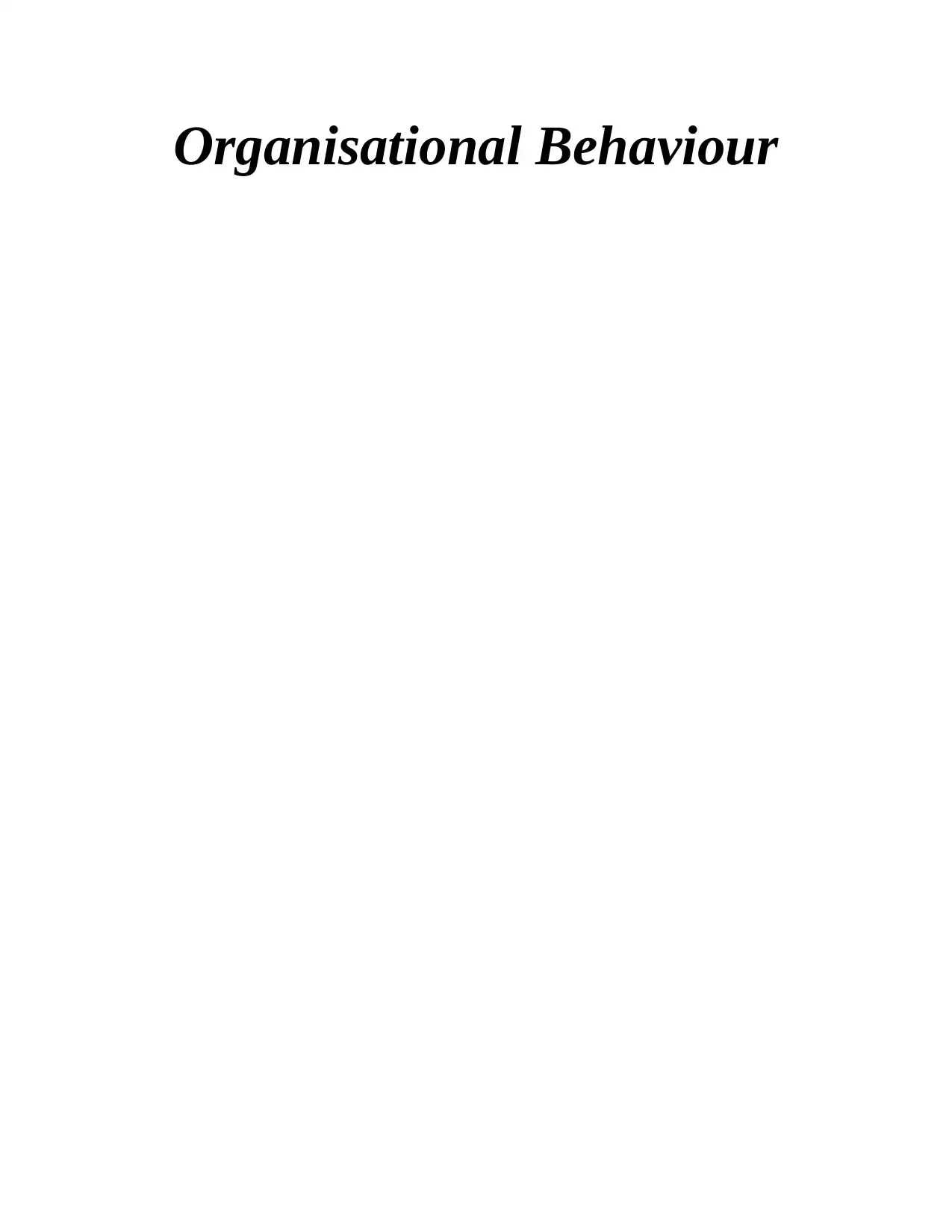
Organisational Behaviour
Paraphrase This Document
Need a fresh take? Get an instant paraphrase of this document with our AI Paraphraser
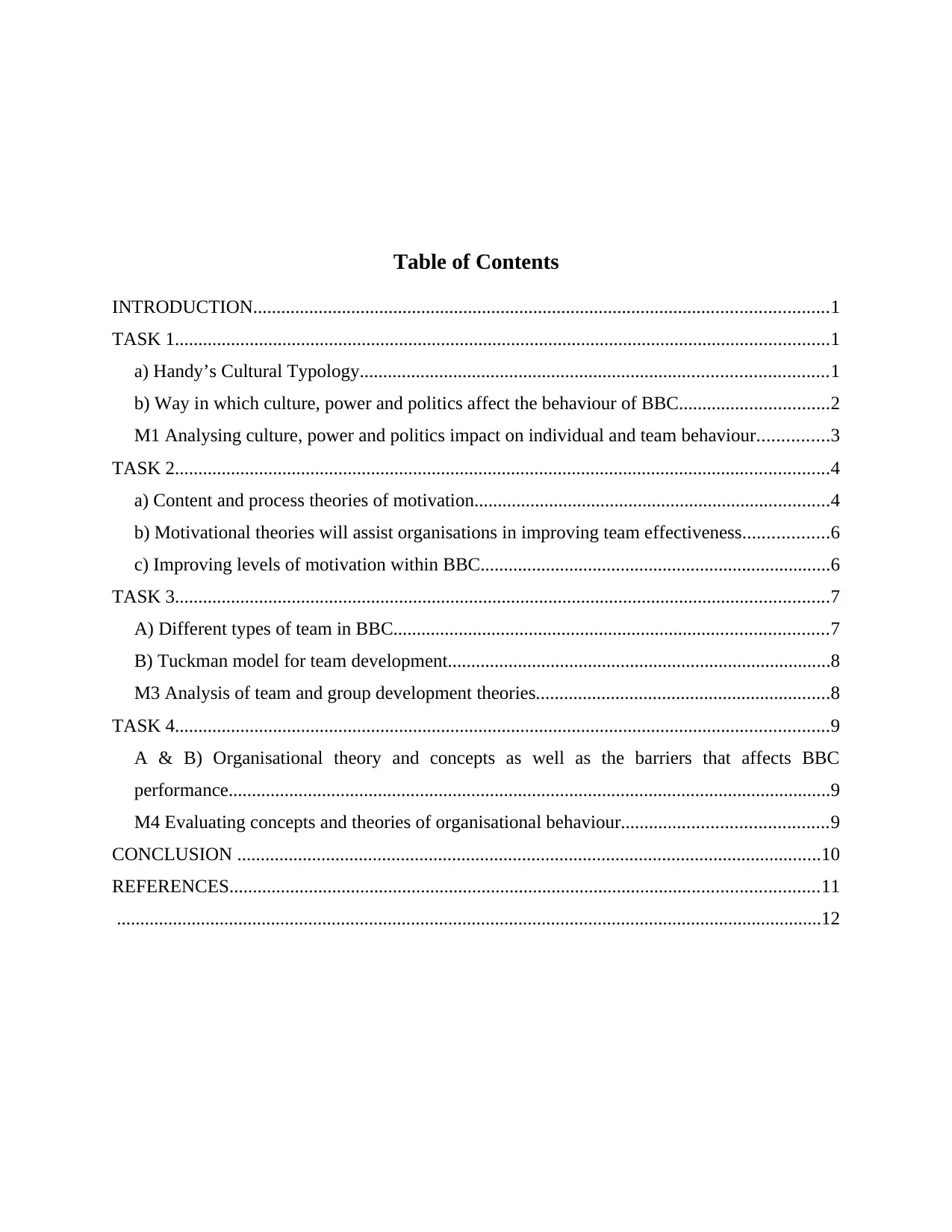
Table of Contents
INTRODUCTION...........................................................................................................................1
TASK 1............................................................................................................................................1
a) Handy’s Cultural Typology....................................................................................................1
b) Way in which culture, power and politics affect the behaviour of BBC................................2
M1 Analysing culture, power and politics impact on individual and team behaviour...............3
TASK 2............................................................................................................................................4
a) Content and process theories of motivation............................................................................4
b) Motivational theories will assist organisations in improving team effectiveness..................6
c) Improving levels of motivation within BBC...........................................................................6
TASK 3............................................................................................................................................7
A) Different types of team in BBC.............................................................................................7
B) Tuckman model for team development..................................................................................8
M3 Analysis of team and group development theories...............................................................8
TASK 4............................................................................................................................................9
A & B) Organisational theory and concepts as well as the barriers that affects BBC
performance.................................................................................................................................9
M4 Evaluating concepts and theories of organisational behaviour............................................9
CONCLUSION .............................................................................................................................10
REFERENCES..............................................................................................................................11
.......................................................................................................................................................12
INTRODUCTION...........................................................................................................................1
TASK 1............................................................................................................................................1
a) Handy’s Cultural Typology....................................................................................................1
b) Way in which culture, power and politics affect the behaviour of BBC................................2
M1 Analysing culture, power and politics impact on individual and team behaviour...............3
TASK 2............................................................................................................................................4
a) Content and process theories of motivation............................................................................4
b) Motivational theories will assist organisations in improving team effectiveness..................6
c) Improving levels of motivation within BBC...........................................................................6
TASK 3............................................................................................................................................7
A) Different types of team in BBC.............................................................................................7
B) Tuckman model for team development..................................................................................8
M3 Analysis of team and group development theories...............................................................8
TASK 4............................................................................................................................................9
A & B) Organisational theory and concepts as well as the barriers that affects BBC
performance.................................................................................................................................9
M4 Evaluating concepts and theories of organisational behaviour............................................9
CONCLUSION .............................................................................................................................10
REFERENCES..............................................................................................................................11
.......................................................................................................................................................12
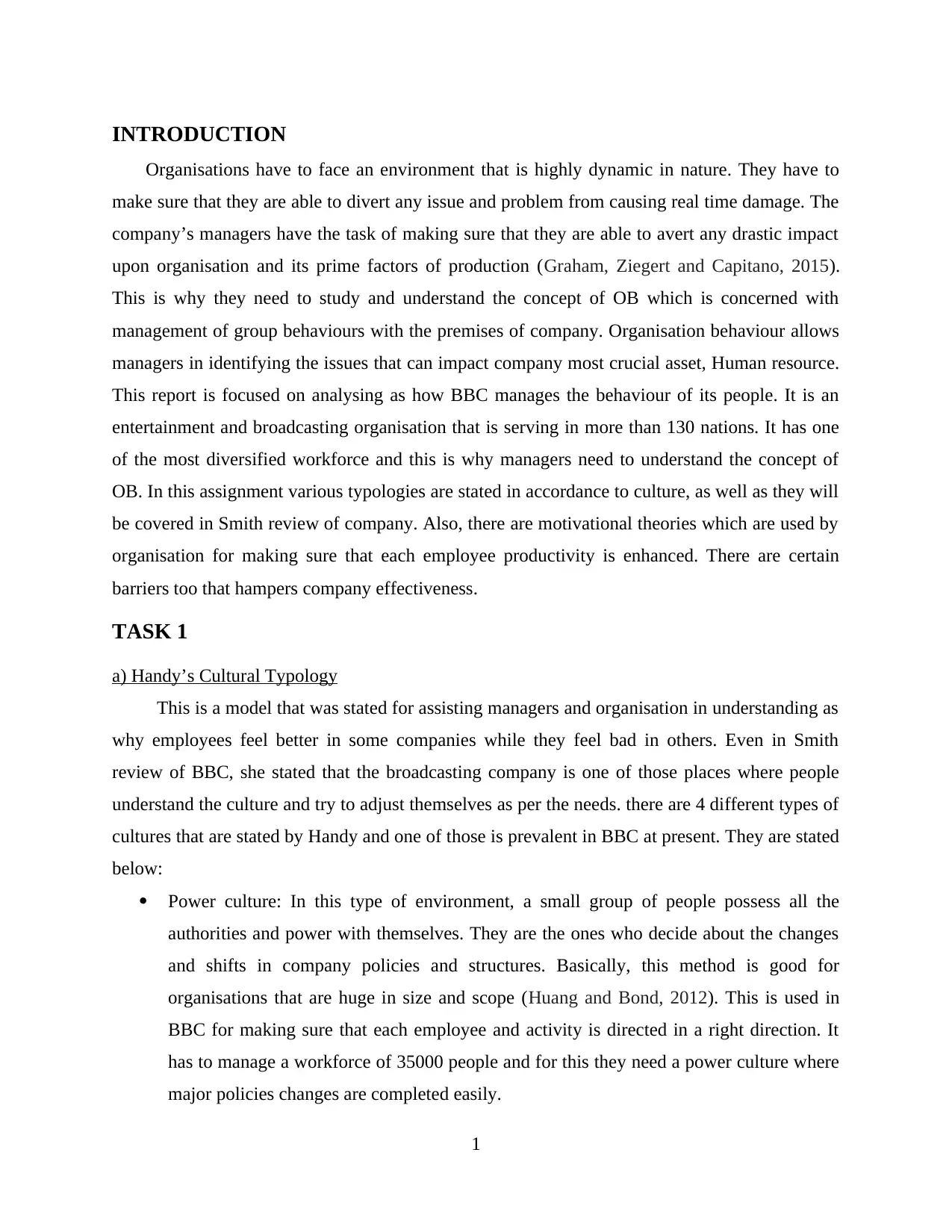
INTRODUCTION
Organisations have to face an environment that is highly dynamic in nature. They have to
make sure that they are able to divert any issue and problem from causing real time damage. The
company’s managers have the task of making sure that they are able to avert any drastic impact
upon organisation and its prime factors of production (Graham, Ziegert and Capitano, 2015).
This is why they need to study and understand the concept of OB which is concerned with
management of group behaviours with the premises of company. Organisation behaviour allows
managers in identifying the issues that can impact company most crucial asset, Human resource.
This report is focused on analysing as how BBC manages the behaviour of its people. It is an
entertainment and broadcasting organisation that is serving in more than 130 nations. It has one
of the most diversified workforce and this is why managers need to understand the concept of
OB. In this assignment various typologies are stated in accordance to culture, as well as they will
be covered in Smith review of company. Also, there are motivational theories which are used by
organisation for making sure that each employee productivity is enhanced. There are certain
barriers too that hampers company effectiveness.
TASK 1
a) Handy’s Cultural Typology
This is a model that was stated for assisting managers and organisation in understanding as
why employees feel better in some companies while they feel bad in others. Even in Smith
review of BBC, she stated that the broadcasting company is one of those places where people
understand the culture and try to adjust themselves as per the needs. there are 4 different types of
cultures that are stated by Handy and one of those is prevalent in BBC at present. They are stated
below:
Power culture: In this type of environment, a small group of people possess all the
authorities and power with themselves. They are the ones who decide about the changes
and shifts in company policies and structures. Basically, this method is good for
organisations that are huge in size and scope (Huang and Bond, 2012). This is used in
BBC for making sure that each employee and activity is directed in a right direction. It
has to manage a workforce of 35000 people and for this they need a power culture where
major policies changes are completed easily.
1
Organisations have to face an environment that is highly dynamic in nature. They have to
make sure that they are able to divert any issue and problem from causing real time damage. The
company’s managers have the task of making sure that they are able to avert any drastic impact
upon organisation and its prime factors of production (Graham, Ziegert and Capitano, 2015).
This is why they need to study and understand the concept of OB which is concerned with
management of group behaviours with the premises of company. Organisation behaviour allows
managers in identifying the issues that can impact company most crucial asset, Human resource.
This report is focused on analysing as how BBC manages the behaviour of its people. It is an
entertainment and broadcasting organisation that is serving in more than 130 nations. It has one
of the most diversified workforce and this is why managers need to understand the concept of
OB. In this assignment various typologies are stated in accordance to culture, as well as they will
be covered in Smith review of company. Also, there are motivational theories which are used by
organisation for making sure that each employee productivity is enhanced. There are certain
barriers too that hampers company effectiveness.
TASK 1
a) Handy’s Cultural Typology
This is a model that was stated for assisting managers and organisation in understanding as
why employees feel better in some companies while they feel bad in others. Even in Smith
review of BBC, she stated that the broadcasting company is one of those places where people
understand the culture and try to adjust themselves as per the needs. there are 4 different types of
cultures that are stated by Handy and one of those is prevalent in BBC at present. They are stated
below:
Power culture: In this type of environment, a small group of people possess all the
authorities and power with themselves. They are the ones who decide about the changes
and shifts in company policies and structures. Basically, this method is good for
organisations that are huge in size and scope (Huang and Bond, 2012). This is used in
BBC for making sure that each employee and activity is directed in a right direction. It
has to manage a workforce of 35000 people and for this they need a power culture where
major policies changes are completed easily.
1
⊘ This is a preview!⊘
Do you want full access?
Subscribe today to unlock all pages.

Trusted by 1+ million students worldwide
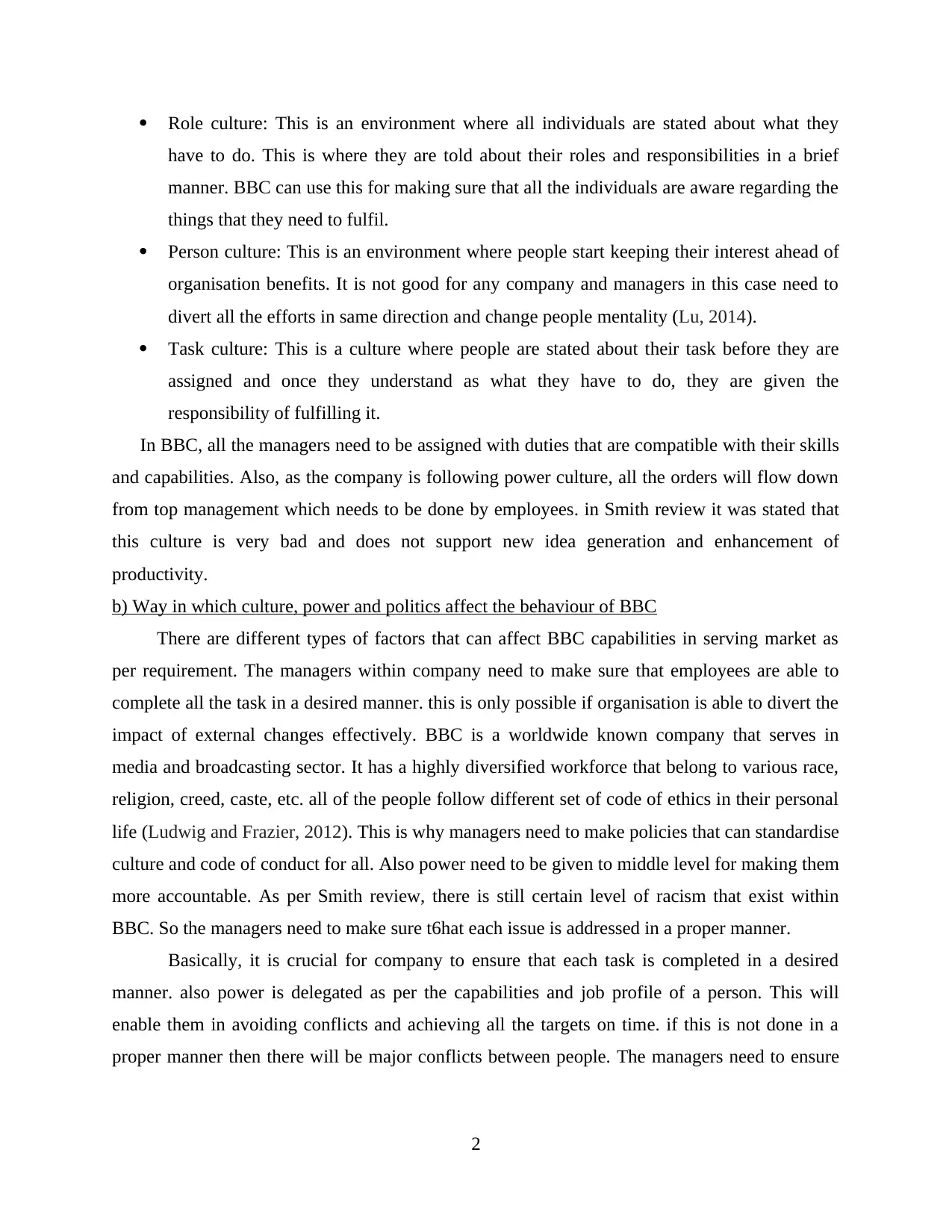
Role culture: This is an environment where all individuals are stated about what they
have to do. This is where they are told about their roles and responsibilities in a brief
manner. BBC can use this for making sure that all the individuals are aware regarding the
things that they need to fulfil.
Person culture: This is an environment where people start keeping their interest ahead of
organisation benefits. It is not good for any company and managers in this case need to
divert all the efforts in same direction and change people mentality (Lu, 2014).
Task culture: This is a culture where people are stated about their task before they are
assigned and once they understand as what they have to do, they are given the
responsibility of fulfilling it.
In BBC, all the managers need to be assigned with duties that are compatible with their skills
and capabilities. Also, as the company is following power culture, all the orders will flow down
from top management which needs to be done by employees. in Smith review it was stated that
this culture is very bad and does not support new idea generation and enhancement of
productivity.
b) Way in which culture, power and politics affect the behaviour of BBC
There are different types of factors that can affect BBC capabilities in serving market as
per requirement. The managers within company need to make sure that employees are able to
complete all the task in a desired manner. this is only possible if organisation is able to divert the
impact of external changes effectively. BBC is a worldwide known company that serves in
media and broadcasting sector. It has a highly diversified workforce that belong to various race,
religion, creed, caste, etc. all of the people follow different set of code of ethics in their personal
life (Ludwig and Frazier, 2012). This is why managers need to make policies that can standardise
culture and code of conduct for all. Also power need to be given to middle level for making them
more accountable. As per Smith review, there is still certain level of racism that exist within
BBC. So the managers need to make sure t6hat each issue is addressed in a proper manner.
Basically, it is crucial for company to ensure that each task is completed in a desired
manner. also power is delegated as per the capabilities and job profile of a person. This will
enable them in avoiding conflicts and achieving all the targets on time. if this is not done in a
proper manner then there will be major conflicts between people. The managers need to ensure
2
have to do. This is where they are told about their roles and responsibilities in a brief
manner. BBC can use this for making sure that all the individuals are aware regarding the
things that they need to fulfil.
Person culture: This is an environment where people start keeping their interest ahead of
organisation benefits. It is not good for any company and managers in this case need to
divert all the efforts in same direction and change people mentality (Lu, 2014).
Task culture: This is a culture where people are stated about their task before they are
assigned and once they understand as what they have to do, they are given the
responsibility of fulfilling it.
In BBC, all the managers need to be assigned with duties that are compatible with their skills
and capabilities. Also, as the company is following power culture, all the orders will flow down
from top management which needs to be done by employees. in Smith review it was stated that
this culture is very bad and does not support new idea generation and enhancement of
productivity.
b) Way in which culture, power and politics affect the behaviour of BBC
There are different types of factors that can affect BBC capabilities in serving market as
per requirement. The managers within company need to make sure that employees are able to
complete all the task in a desired manner. this is only possible if organisation is able to divert the
impact of external changes effectively. BBC is a worldwide known company that serves in
media and broadcasting sector. It has a highly diversified workforce that belong to various race,
religion, creed, caste, etc. all of the people follow different set of code of ethics in their personal
life (Ludwig and Frazier, 2012). This is why managers need to make policies that can standardise
culture and code of conduct for all. Also power need to be given to middle level for making them
more accountable. As per Smith review, there is still certain level of racism that exist within
BBC. So the managers need to make sure t6hat each issue is addressed in a proper manner.
Basically, it is crucial for company to ensure that each task is completed in a desired
manner. also power is delegated as per the capabilities and job profile of a person. This will
enable them in avoiding conflicts and achieving all the targets on time. if this is not done in a
proper manner then there will be major conflicts between people. The managers need to ensure
2
Paraphrase This Document
Need a fresh take? Get an instant paraphrase of this document with our AI Paraphraser
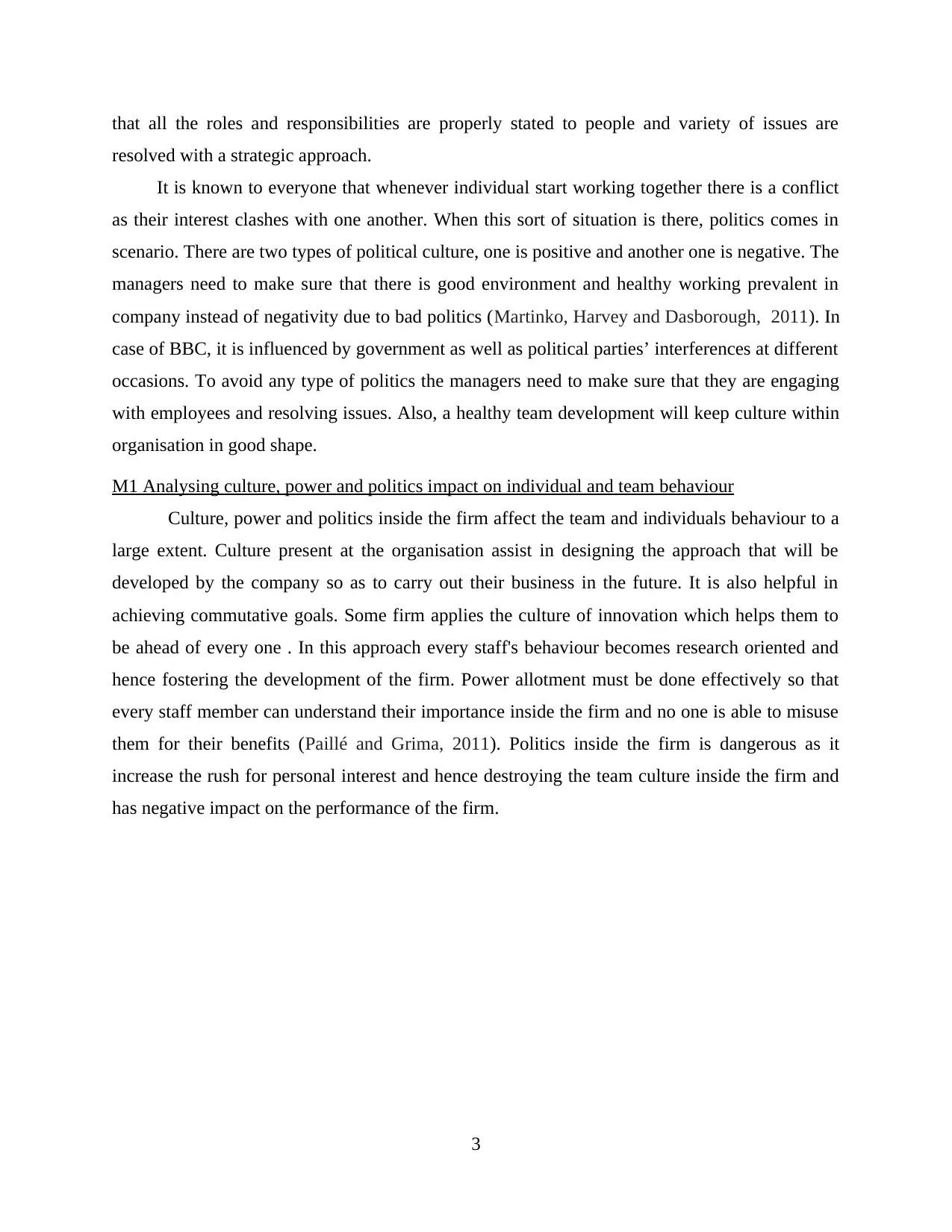
that all the roles and responsibilities are properly stated to people and variety of issues are
resolved with a strategic approach.
It is known to everyone that whenever individual start working together there is a conflict
as their interest clashes with one another. When this sort of situation is there, politics comes in
scenario. There are two types of political culture, one is positive and another one is negative. The
managers need to make sure that there is good environment and healthy working prevalent in
company instead of negativity due to bad politics (Martinko, Harvey and Dasborough, 2011). In
case of BBC, it is influenced by government as well as political parties’ interferences at different
occasions. To avoid any type of politics the managers need to make sure that they are engaging
with employees and resolving issues. Also, a healthy team development will keep culture within
organisation in good shape.
M1 Analysing culture, power and politics impact on individual and team behaviour
Culture, power and politics inside the firm affect the team and individuals behaviour to a
large extent. Culture present at the organisation assist in designing the approach that will be
developed by the company so as to carry out their business in the future. It is also helpful in
achieving commutative goals. Some firm applies the culture of innovation which helps them to
be ahead of every one . In this approach every staff's behaviour becomes research oriented and
hence fostering the development of the firm. Power allotment must be done effectively so that
every staff member can understand their importance inside the firm and no one is able to misuse
them for their benefits (Paillé and Grima, 2011). Politics inside the firm is dangerous as it
increase the rush for personal interest and hence destroying the team culture inside the firm and
has negative impact on the performance of the firm.
3
resolved with a strategic approach.
It is known to everyone that whenever individual start working together there is a conflict
as their interest clashes with one another. When this sort of situation is there, politics comes in
scenario. There are two types of political culture, one is positive and another one is negative. The
managers need to make sure that there is good environment and healthy working prevalent in
company instead of negativity due to bad politics (Martinko, Harvey and Dasborough, 2011). In
case of BBC, it is influenced by government as well as political parties’ interferences at different
occasions. To avoid any type of politics the managers need to make sure that they are engaging
with employees and resolving issues. Also, a healthy team development will keep culture within
organisation in good shape.
M1 Analysing culture, power and politics impact on individual and team behaviour
Culture, power and politics inside the firm affect the team and individuals behaviour to a
large extent. Culture present at the organisation assist in designing the approach that will be
developed by the company so as to carry out their business in the future. It is also helpful in
achieving commutative goals. Some firm applies the culture of innovation which helps them to
be ahead of every one . In this approach every staff's behaviour becomes research oriented and
hence fostering the development of the firm. Power allotment must be done effectively so that
every staff member can understand their importance inside the firm and no one is able to misuse
them for their benefits (Paillé and Grima, 2011). Politics inside the firm is dangerous as it
increase the rush for personal interest and hence destroying the team culture inside the firm and
has negative impact on the performance of the firm.
3
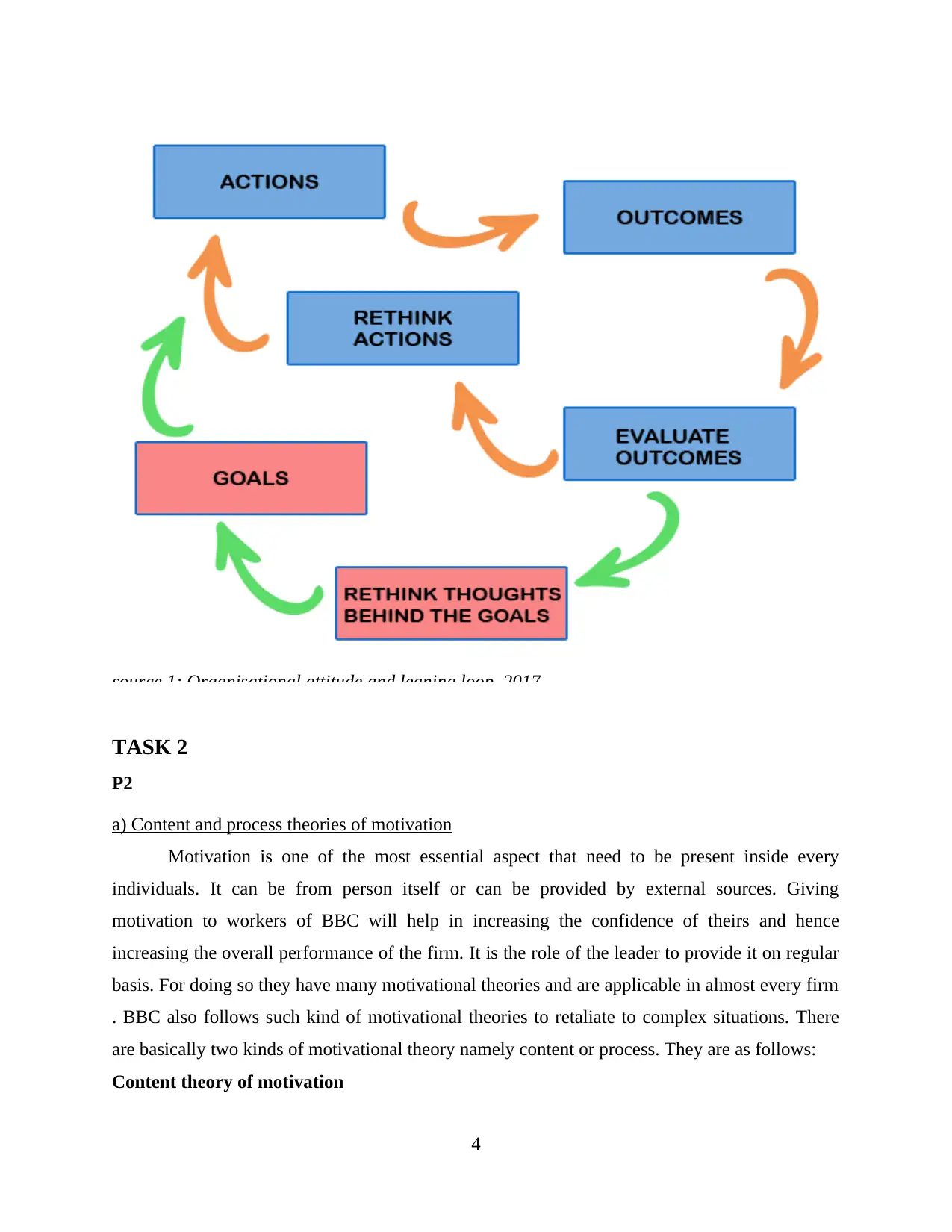
TASK 2
P2
a) Content and process theories of motivation
Motivation is one of the most essential aspect that need to be present inside every
individuals. It can be from person itself or can be provided by external sources. Giving
motivation to workers of BBC will help in increasing the confidence of theirs and hence
increasing the overall performance of the firm. It is the role of the leader to provide it on regular
basis. For doing so they have many motivational theories and are applicable in almost every firm
. BBC also follows such kind of motivational theories to retaliate to complex situations. There
are basically two kinds of motivational theory namely content or process. They are as follows:
Content theory of motivation
4
source 1: Organisational attitude and leaning loop, 2017
P2
a) Content and process theories of motivation
Motivation is one of the most essential aspect that need to be present inside every
individuals. It can be from person itself or can be provided by external sources. Giving
motivation to workers of BBC will help in increasing the confidence of theirs and hence
increasing the overall performance of the firm. It is the role of the leader to provide it on regular
basis. For doing so they have many motivational theories and are applicable in almost every firm
. BBC also follows such kind of motivational theories to retaliate to complex situations. There
are basically two kinds of motivational theory namely content or process. They are as follows:
Content theory of motivation
4
source 1: Organisational attitude and leaning loop, 2017
⊘ This is a preview!⊘
Do you want full access?
Subscribe today to unlock all pages.

Trusted by 1+ million students worldwide
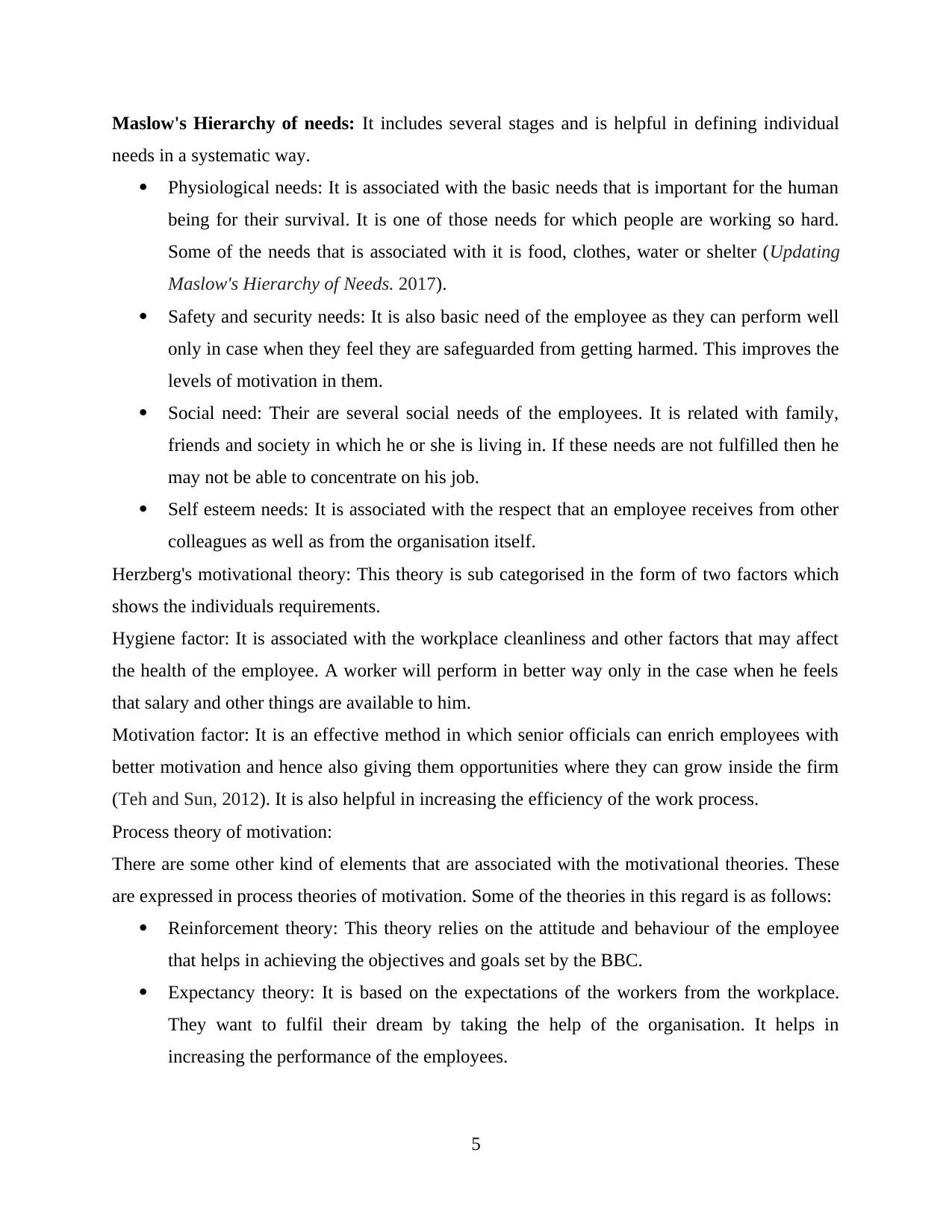
Maslow's Hierarchy of needs: It includes several stages and is helpful in defining individual
needs in a systematic way.
Physiological needs: It is associated with the basic needs that is important for the human
being for their survival. It is one of those needs for which people are working so hard.
Some of the needs that is associated with it is food, clothes, water or shelter (Updating
Maslow's Hierarchy of Needs. 2017).
Safety and security needs: It is also basic need of the employee as they can perform well
only in case when they feel they are safeguarded from getting harmed. This improves the
levels of motivation in them.
Social need: Their are several social needs of the employees. It is related with family,
friends and society in which he or she is living in. If these needs are not fulfilled then he
may not be able to concentrate on his job.
Self esteem needs: It is associated with the respect that an employee receives from other
colleagues as well as from the organisation itself.
Herzberg's motivational theory: This theory is sub categorised in the form of two factors which
shows the individuals requirements.
Hygiene factor: It is associated with the workplace cleanliness and other factors that may affect
the health of the employee. A worker will perform in better way only in the case when he feels
that salary and other things are available to him.
Motivation factor: It is an effective method in which senior officials can enrich employees with
better motivation and hence also giving them opportunities where they can grow inside the firm
(Teh and Sun, 2012). It is also helpful in increasing the efficiency of the work process.
Process theory of motivation:
There are some other kind of elements that are associated with the motivational theories. These
are expressed in process theories of motivation. Some of the theories in this regard is as follows:
Reinforcement theory: This theory relies on the attitude and behaviour of the employee
that helps in achieving the objectives and goals set by the BBC.
Expectancy theory: It is based on the expectations of the workers from the workplace.
They want to fulfil their dream by taking the help of the organisation. It helps in
increasing the performance of the employees.
5
needs in a systematic way.
Physiological needs: It is associated with the basic needs that is important for the human
being for their survival. It is one of those needs for which people are working so hard.
Some of the needs that is associated with it is food, clothes, water or shelter (Updating
Maslow's Hierarchy of Needs. 2017).
Safety and security needs: It is also basic need of the employee as they can perform well
only in case when they feel they are safeguarded from getting harmed. This improves the
levels of motivation in them.
Social need: Their are several social needs of the employees. It is related with family,
friends and society in which he or she is living in. If these needs are not fulfilled then he
may not be able to concentrate on his job.
Self esteem needs: It is associated with the respect that an employee receives from other
colleagues as well as from the organisation itself.
Herzberg's motivational theory: This theory is sub categorised in the form of two factors which
shows the individuals requirements.
Hygiene factor: It is associated with the workplace cleanliness and other factors that may affect
the health of the employee. A worker will perform in better way only in the case when he feels
that salary and other things are available to him.
Motivation factor: It is an effective method in which senior officials can enrich employees with
better motivation and hence also giving them opportunities where they can grow inside the firm
(Teh and Sun, 2012). It is also helpful in increasing the efficiency of the work process.
Process theory of motivation:
There are some other kind of elements that are associated with the motivational theories. These
are expressed in process theories of motivation. Some of the theories in this regard is as follows:
Reinforcement theory: This theory relies on the attitude and behaviour of the employee
that helps in achieving the objectives and goals set by the BBC.
Expectancy theory: It is based on the expectations of the workers from the workplace.
They want to fulfil their dream by taking the help of the organisation. It helps in
increasing the performance of the employees.
5
Paraphrase This Document
Need a fresh take? Get an instant paraphrase of this document with our AI Paraphraser
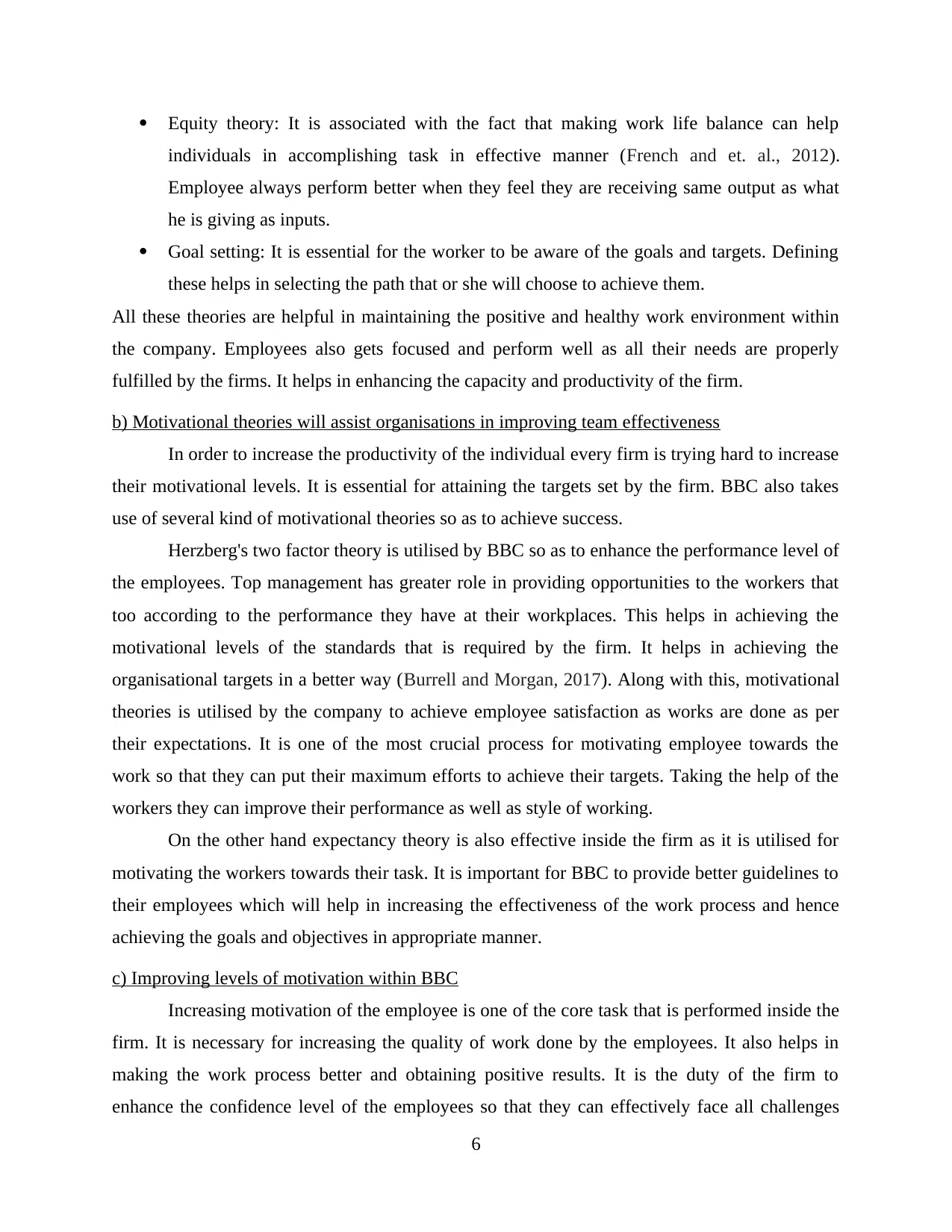
Equity theory: It is associated with the fact that making work life balance can help
individuals in accomplishing task in effective manner (French and et. al., 2012).
Employee always perform better when they feel they are receiving same output as what
he is giving as inputs.
Goal setting: It is essential for the worker to be aware of the goals and targets. Defining
these helps in selecting the path that or she will choose to achieve them.
All these theories are helpful in maintaining the positive and healthy work environment within
the company. Employees also gets focused and perform well as all their needs are properly
fulfilled by the firms. It helps in enhancing the capacity and productivity of the firm.
b) Motivational theories will assist organisations in improving team effectiveness
In order to increase the productivity of the individual every firm is trying hard to increase
their motivational levels. It is essential for attaining the targets set by the firm. BBC also takes
use of several kind of motivational theories so as to achieve success.
Herzberg's two factor theory is utilised by BBC so as to enhance the performance level of
the employees. Top management has greater role in providing opportunities to the workers that
too according to the performance they have at their workplaces. This helps in achieving the
motivational levels of the standards that is required by the firm. It helps in achieving the
organisational targets in a better way (Burrell and Morgan, 2017). Along with this, motivational
theories is utilised by the company to achieve employee satisfaction as works are done as per
their expectations. It is one of the most crucial process for motivating employee towards the
work so that they can put their maximum efforts to achieve their targets. Taking the help of the
workers they can improve their performance as well as style of working.
On the other hand expectancy theory is also effective inside the firm as it is utilised for
motivating the workers towards their task. It is important for BBC to provide better guidelines to
their employees which will help in increasing the effectiveness of the work process and hence
achieving the goals and objectives in appropriate manner.
c) Improving levels of motivation within BBC
Increasing motivation of the employee is one of the core task that is performed inside the
firm. It is necessary for increasing the quality of work done by the employees. It also helps in
making the work process better and obtaining positive results. It is the duty of the firm to
enhance the confidence level of the employees so that they can effectively face all challenges
6
individuals in accomplishing task in effective manner (French and et. al., 2012).
Employee always perform better when they feel they are receiving same output as what
he is giving as inputs.
Goal setting: It is essential for the worker to be aware of the goals and targets. Defining
these helps in selecting the path that or she will choose to achieve them.
All these theories are helpful in maintaining the positive and healthy work environment within
the company. Employees also gets focused and perform well as all their needs are properly
fulfilled by the firms. It helps in enhancing the capacity and productivity of the firm.
b) Motivational theories will assist organisations in improving team effectiveness
In order to increase the productivity of the individual every firm is trying hard to increase
their motivational levels. It is essential for attaining the targets set by the firm. BBC also takes
use of several kind of motivational theories so as to achieve success.
Herzberg's two factor theory is utilised by BBC so as to enhance the performance level of
the employees. Top management has greater role in providing opportunities to the workers that
too according to the performance they have at their workplaces. This helps in achieving the
motivational levels of the standards that is required by the firm. It helps in achieving the
organisational targets in a better way (Burrell and Morgan, 2017). Along with this, motivational
theories is utilised by the company to achieve employee satisfaction as works are done as per
their expectations. It is one of the most crucial process for motivating employee towards the
work so that they can put their maximum efforts to achieve their targets. Taking the help of the
workers they can improve their performance as well as style of working.
On the other hand expectancy theory is also effective inside the firm as it is utilised for
motivating the workers towards their task. It is important for BBC to provide better guidelines to
their employees which will help in increasing the effectiveness of the work process and hence
achieving the goals and objectives in appropriate manner.
c) Improving levels of motivation within BBC
Increasing motivation of the employee is one of the core task that is performed inside the
firm. It is necessary for increasing the quality of work done by the employees. It also helps in
making the work process better and obtaining positive results. It is the duty of the firm to
enhance the confidence level of the employees so that they can effectively face all challenges
6
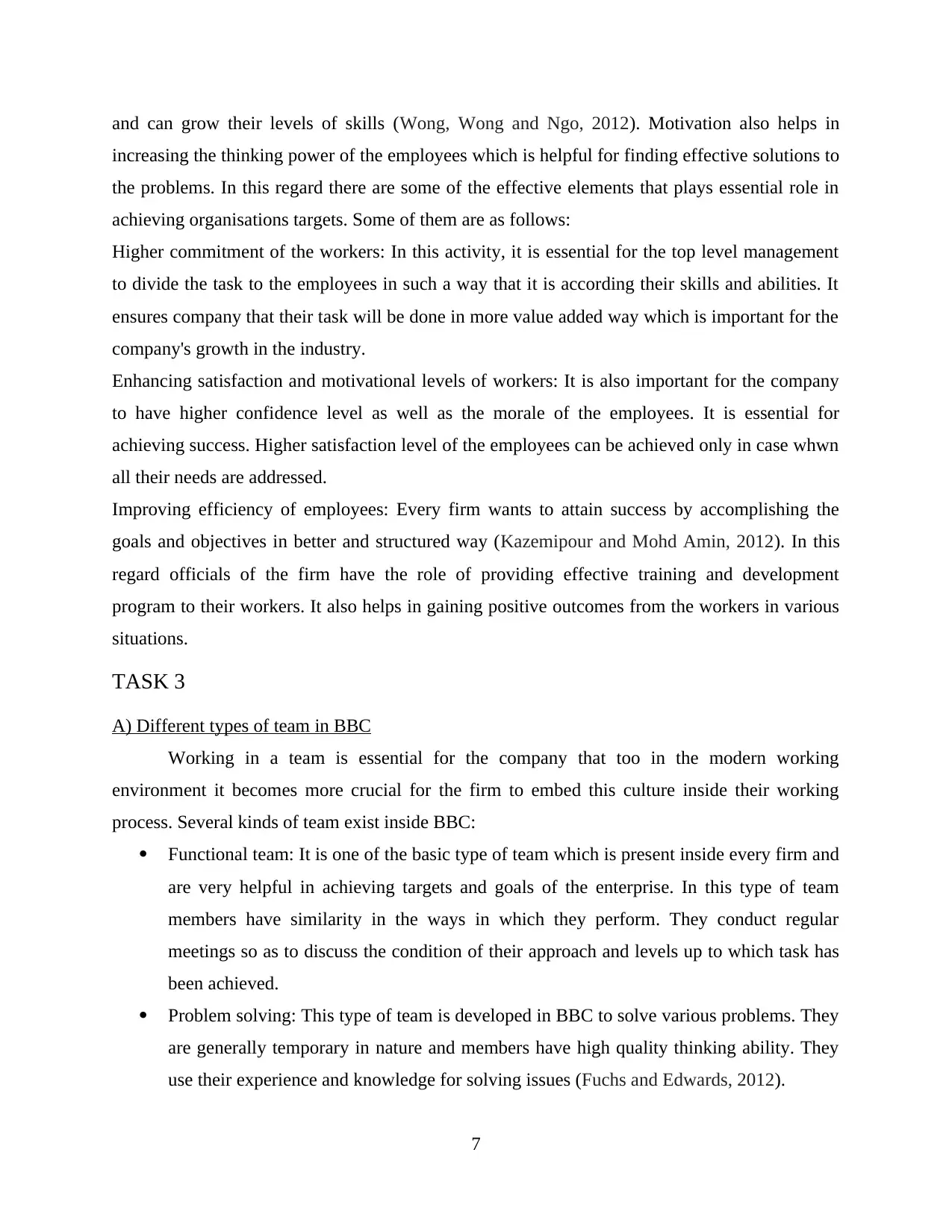
and can grow their levels of skills (Wong, Wong and Ngo, 2012). Motivation also helps in
increasing the thinking power of the employees which is helpful for finding effective solutions to
the problems. In this regard there are some of the effective elements that plays essential role in
achieving organisations targets. Some of them are as follows:
Higher commitment of the workers: In this activity, it is essential for the top level management
to divide the task to the employees in such a way that it is according their skills and abilities. It
ensures company that their task will be done in more value added way which is important for the
company's growth in the industry.
Enhancing satisfaction and motivational levels of workers: It is also important for the company
to have higher confidence level as well as the morale of the employees. It is essential for
achieving success. Higher satisfaction level of the employees can be achieved only in case whwn
all their needs are addressed.
Improving efficiency of employees: Every firm wants to attain success by accomplishing the
goals and objectives in better and structured way (Kazemipour and Mohd Amin, 2012). In this
regard officials of the firm have the role of providing effective training and development
program to their workers. It also helps in gaining positive outcomes from the workers in various
situations.
TASK 3
A) Different types of team in BBC
Working in a team is essential for the company that too in the modern working
environment it becomes more crucial for the firm to embed this culture inside their working
process. Several kinds of team exist inside BBC:
Functional team: It is one of the basic type of team which is present inside every firm and
are very helpful in achieving targets and goals of the enterprise. In this type of team
members have similarity in the ways in which they perform. They conduct regular
meetings so as to discuss the condition of their approach and levels up to which task has
been achieved.
Problem solving: This type of team is developed in BBC to solve various problems. They
are generally temporary in nature and members have high quality thinking ability. They
use their experience and knowledge for solving issues (Fuchs and Edwards, 2012).
7
increasing the thinking power of the employees which is helpful for finding effective solutions to
the problems. In this regard there are some of the effective elements that plays essential role in
achieving organisations targets. Some of them are as follows:
Higher commitment of the workers: In this activity, it is essential for the top level management
to divide the task to the employees in such a way that it is according their skills and abilities. It
ensures company that their task will be done in more value added way which is important for the
company's growth in the industry.
Enhancing satisfaction and motivational levels of workers: It is also important for the company
to have higher confidence level as well as the morale of the employees. It is essential for
achieving success. Higher satisfaction level of the employees can be achieved only in case whwn
all their needs are addressed.
Improving efficiency of employees: Every firm wants to attain success by accomplishing the
goals and objectives in better and structured way (Kazemipour and Mohd Amin, 2012). In this
regard officials of the firm have the role of providing effective training and development
program to their workers. It also helps in gaining positive outcomes from the workers in various
situations.
TASK 3
A) Different types of team in BBC
Working in a team is essential for the company that too in the modern working
environment it becomes more crucial for the firm to embed this culture inside their working
process. Several kinds of team exist inside BBC:
Functional team: It is one of the basic type of team which is present inside every firm and
are very helpful in achieving targets and goals of the enterprise. In this type of team
members have similarity in the ways in which they perform. They conduct regular
meetings so as to discuss the condition of their approach and levels up to which task has
been achieved.
Problem solving: This type of team is developed in BBC to solve various problems. They
are generally temporary in nature and members have high quality thinking ability. They
use their experience and knowledge for solving issues (Fuchs and Edwards, 2012).
7
⊘ This is a preview!⊘
Do you want full access?
Subscribe today to unlock all pages.

Trusted by 1+ million students worldwide
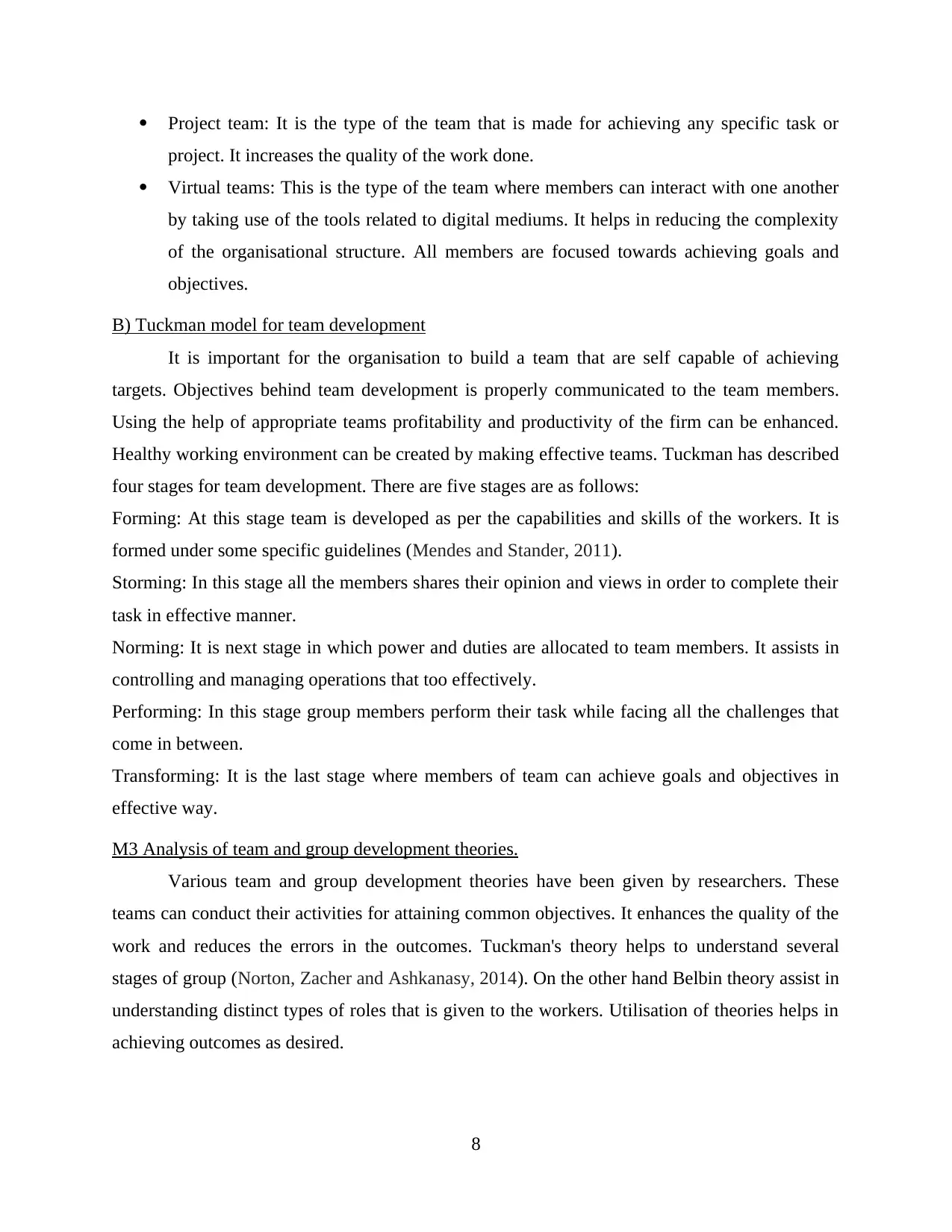
Project team: It is the type of the team that is made for achieving any specific task or
project. It increases the quality of the work done.
Virtual teams: This is the type of the team where members can interact with one another
by taking use of the tools related to digital mediums. It helps in reducing the complexity
of the organisational structure. All members are focused towards achieving goals and
objectives.
B) Tuckman model for team development
It is important for the organisation to build a team that are self capable of achieving
targets. Objectives behind team development is properly communicated to the team members.
Using the help of appropriate teams profitability and productivity of the firm can be enhanced.
Healthy working environment can be created by making effective teams. Tuckman has described
four stages for team development. There are five stages are as follows:
Forming: At this stage team is developed as per the capabilities and skills of the workers. It is
formed under some specific guidelines (Mendes and Stander, 2011).
Storming: In this stage all the members shares their opinion and views in order to complete their
task in effective manner.
Norming: It is next stage in which power and duties are allocated to team members. It assists in
controlling and managing operations that too effectively.
Performing: In this stage group members perform their task while facing all the challenges that
come in between.
Transforming: It is the last stage where members of team can achieve goals and objectives in
effective way.
M3 Analysis of team and group development theories.
Various team and group development theories have been given by researchers. These
teams can conduct their activities for attaining common objectives. It enhances the quality of the
work and reduces the errors in the outcomes. Tuckman's theory helps to understand several
stages of group (Norton, Zacher and Ashkanasy, 2014). On the other hand Belbin theory assist in
understanding distinct types of roles that is given to the workers. Utilisation of theories helps in
achieving outcomes as desired.
8
project. It increases the quality of the work done.
Virtual teams: This is the type of the team where members can interact with one another
by taking use of the tools related to digital mediums. It helps in reducing the complexity
of the organisational structure. All members are focused towards achieving goals and
objectives.
B) Tuckman model for team development
It is important for the organisation to build a team that are self capable of achieving
targets. Objectives behind team development is properly communicated to the team members.
Using the help of appropriate teams profitability and productivity of the firm can be enhanced.
Healthy working environment can be created by making effective teams. Tuckman has described
four stages for team development. There are five stages are as follows:
Forming: At this stage team is developed as per the capabilities and skills of the workers. It is
formed under some specific guidelines (Mendes and Stander, 2011).
Storming: In this stage all the members shares their opinion and views in order to complete their
task in effective manner.
Norming: It is next stage in which power and duties are allocated to team members. It assists in
controlling and managing operations that too effectively.
Performing: In this stage group members perform their task while facing all the challenges that
come in between.
Transforming: It is the last stage where members of team can achieve goals and objectives in
effective way.
M3 Analysis of team and group development theories.
Various team and group development theories have been given by researchers. These
teams can conduct their activities for attaining common objectives. It enhances the quality of the
work and reduces the errors in the outcomes. Tuckman's theory helps to understand several
stages of group (Norton, Zacher and Ashkanasy, 2014). On the other hand Belbin theory assist in
understanding distinct types of roles that is given to the workers. Utilisation of theories helps in
achieving outcomes as desired.
8
Paraphrase This Document
Need a fresh take? Get an instant paraphrase of this document with our AI Paraphraser
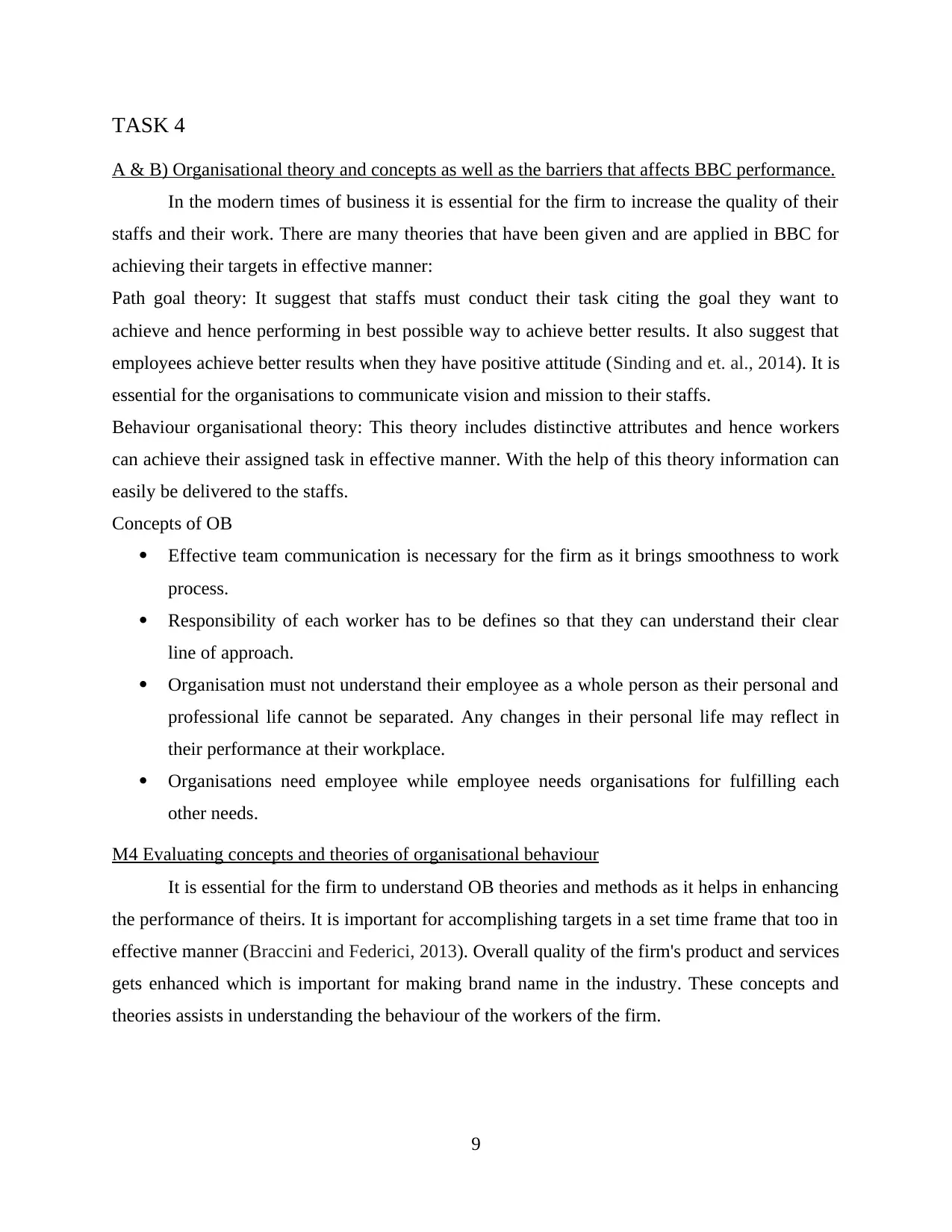
TASK 4
A & B) Organisational theory and concepts as well as the barriers that affects BBC performance.
In the modern times of business it is essential for the firm to increase the quality of their
staffs and their work. There are many theories that have been given and are applied in BBC for
achieving their targets in effective manner:
Path goal theory: It suggest that staffs must conduct their task citing the goal they want to
achieve and hence performing in best possible way to achieve better results. It also suggest that
employees achieve better results when they have positive attitude (Sinding and et. al., 2014). It is
essential for the organisations to communicate vision and mission to their staffs.
Behaviour organisational theory: This theory includes distinctive attributes and hence workers
can achieve their assigned task in effective manner. With the help of this theory information can
easily be delivered to the staffs.
Concepts of OB
Effective team communication is necessary for the firm as it brings smoothness to work
process.
Responsibility of each worker has to be defines so that they can understand their clear
line of approach.
Organisation must not understand their employee as a whole person as their personal and
professional life cannot be separated. Any changes in their personal life may reflect in
their performance at their workplace.
Organisations need employee while employee needs organisations for fulfilling each
other needs.
M4 Evaluating concepts and theories of organisational behaviour
It is essential for the firm to understand OB theories and methods as it helps in enhancing
the performance of theirs. It is important for accomplishing targets in a set time frame that too in
effective manner (Braccini and Federici, 2013). Overall quality of the firm's product and services
gets enhanced which is important for making brand name in the industry. These concepts and
theories assists in understanding the behaviour of the workers of the firm.
9
A & B) Organisational theory and concepts as well as the barriers that affects BBC performance.
In the modern times of business it is essential for the firm to increase the quality of their
staffs and their work. There are many theories that have been given and are applied in BBC for
achieving their targets in effective manner:
Path goal theory: It suggest that staffs must conduct their task citing the goal they want to
achieve and hence performing in best possible way to achieve better results. It also suggest that
employees achieve better results when they have positive attitude (Sinding and et. al., 2014). It is
essential for the organisations to communicate vision and mission to their staffs.
Behaviour organisational theory: This theory includes distinctive attributes and hence workers
can achieve their assigned task in effective manner. With the help of this theory information can
easily be delivered to the staffs.
Concepts of OB
Effective team communication is necessary for the firm as it brings smoothness to work
process.
Responsibility of each worker has to be defines so that they can understand their clear
line of approach.
Organisation must not understand their employee as a whole person as their personal and
professional life cannot be separated. Any changes in their personal life may reflect in
their performance at their workplace.
Organisations need employee while employee needs organisations for fulfilling each
other needs.
M4 Evaluating concepts and theories of organisational behaviour
It is essential for the firm to understand OB theories and methods as it helps in enhancing
the performance of theirs. It is important for accomplishing targets in a set time frame that too in
effective manner (Braccini and Federici, 2013). Overall quality of the firm's product and services
gets enhanced which is important for making brand name in the industry. These concepts and
theories assists in understanding the behaviour of the workers of the firm.
9
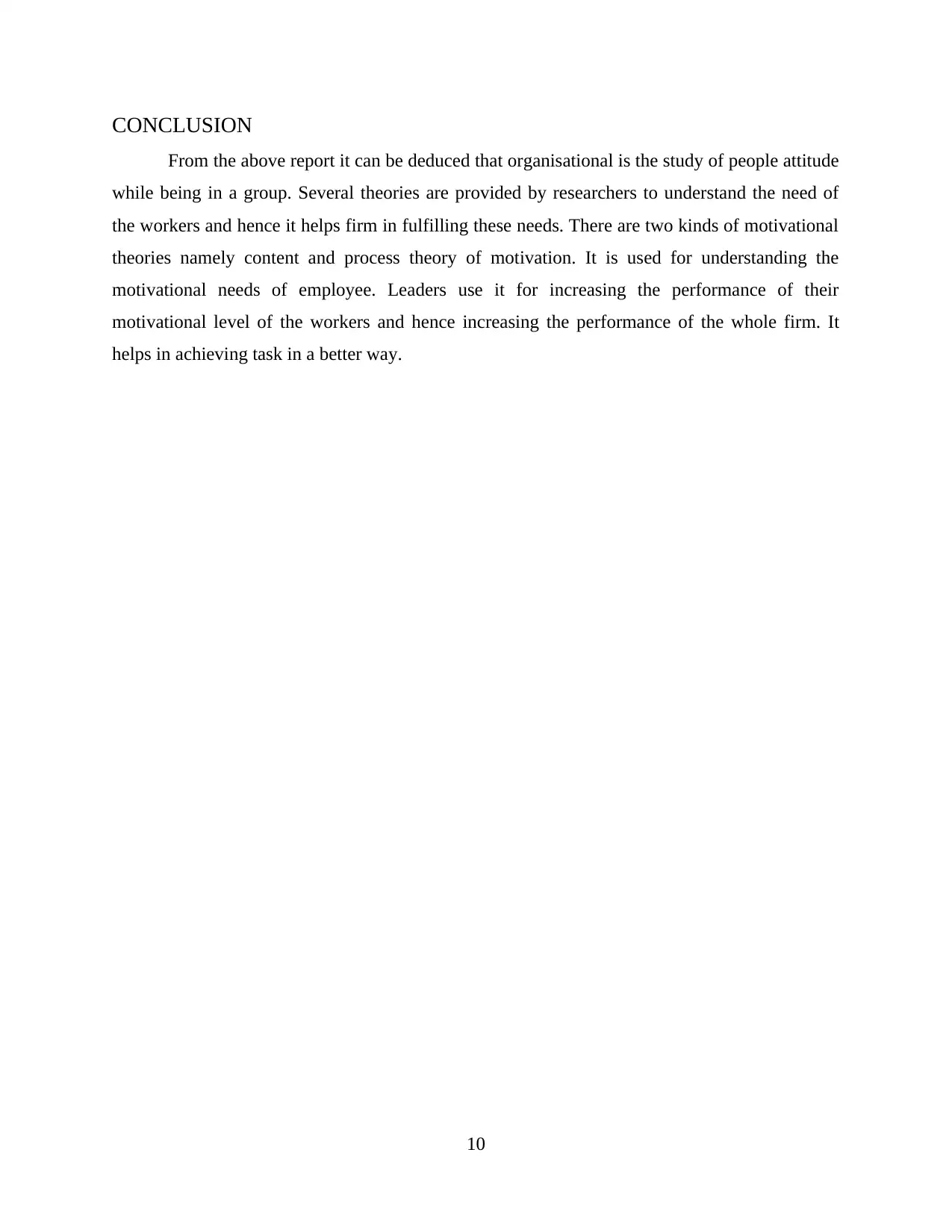
CONCLUSION
From the above report it can be deduced that organisational is the study of people attitude
while being in a group. Several theories are provided by researchers to understand the need of
the workers and hence it helps firm in fulfilling these needs. There are two kinds of motivational
theories namely content and process theory of motivation. It is used for understanding the
motivational needs of employee. Leaders use it for increasing the performance of their
motivational level of the workers and hence increasing the performance of the whole firm. It
helps in achieving task in a better way.
10
From the above report it can be deduced that organisational is the study of people attitude
while being in a group. Several theories are provided by researchers to understand the need of
the workers and hence it helps firm in fulfilling these needs. There are two kinds of motivational
theories namely content and process theory of motivation. It is used for understanding the
motivational needs of employee. Leaders use it for increasing the performance of their
motivational level of the workers and hence increasing the performance of the whole firm. It
helps in achieving task in a better way.
10
⊘ This is a preview!⊘
Do you want full access?
Subscribe today to unlock all pages.

Trusted by 1+ million students worldwide
1 out of 14
Related Documents
Your All-in-One AI-Powered Toolkit for Academic Success.
+13062052269
info@desklib.com
Available 24*7 on WhatsApp / Email
![[object Object]](/_next/static/media/star-bottom.7253800d.svg)
Unlock your academic potential
Copyright © 2020–2026 A2Z Services. All Rights Reserved. Developed and managed by ZUCOL.





